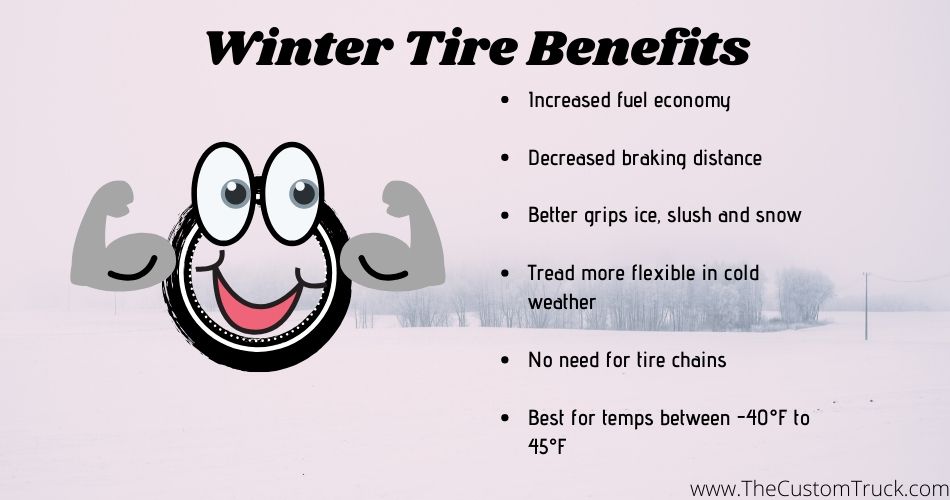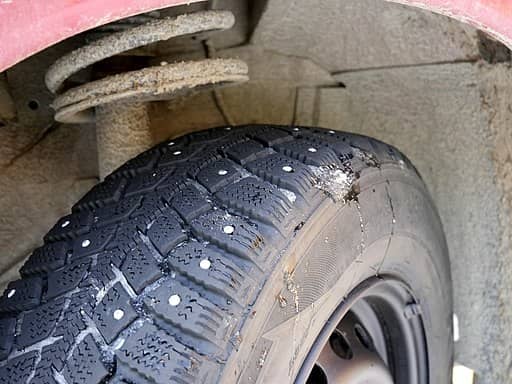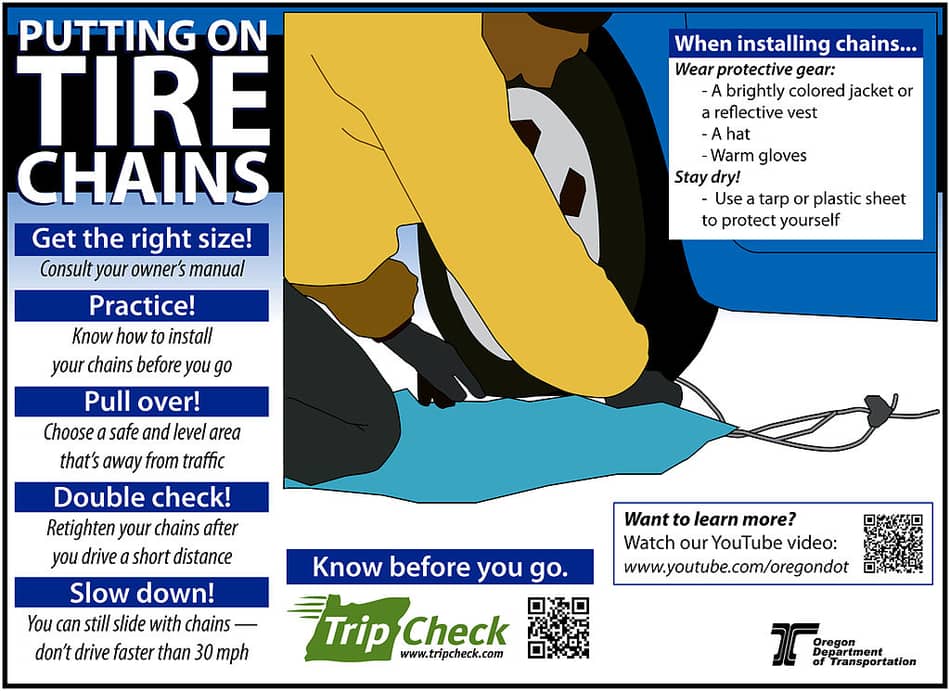Do you live in a cold, snowy climate? Are you worried about ice or snow on the roads? Are you like me and have worried about swerving off the road into an ice cold ditch? If so, you are probably considering having winter tires on your truck. You’re also wondering how they affect your fuel economy.
When driving on frigid cold, icy, and snowy roads with winter tires, you WILL reduce your fuel mileage and save on gas money in the long run. However, if you drove in these same conditions with all-season or summer tires, your fuel economy would suffer greatly.
Do winter tires affect gas mileage?
If you’re driving on roads that are icy or snow-covered, this will normally decrease the grip your tires have on the road and lead to wasted energy. If you keep using your all-season tires, you’ll likely notice a significant increase in your money spent on gas.
It is, therefore, a good idea to change your tires as the weather begins to cool down. Many different makes of winter tires are available, and these have been designed specifically to handle snowy winter conditions.
Winter tires are made from rubber that is able to maintain flexibility as the temperature gets colder. They also provide additional traction and allow the tire to better grip the road, even if it’s icy or covered in snow.
All-season or summer tires are likely to be ineffective and, in some cases, even dangerous during the winter. All-season tires have been designed for use in warmer climates where the likelihood of snow is minimal. They won’t be able to provide optimal traction in snowy conditions.

Why do winter tires affect gas mileage?
Snow tires or winter tires have more traction, and this will help to reduce the additional energy that’s required to grip the road. Sticking with the same all-season tires year round will result in decreased fuel economy during the winter.
Investing in winter tires is a wise choice as it will reduce your truck’s mileage per gallon. It will also make your truck safer for you and your family on the road.
Snow is often wet and slick, which causes the roads to be very slippery. At other times there might not be any snow, but rain may have frozen across the surface of the road, making it unknowingly slick.
Driving in these conditions is dangerous, and you’ll like be forced to slow down on your own. This will reduce the fuel economy of your vehicle, especially when driving at speeds below 30-40 mph. Winter tires are likely to increase safe driving speeds as they grip the ice and snow, making it easier to drive.
Are some winter tires better for gas mileage than others? How so?
While it’s widely recognized that winter tires are better for your gas mileage, not all snow tires are created equally. There are many different makes and models available. They all have different threads and tracks, and this will affect how easy it is to drive through snow.
Some winter tires have much less drag than others. When choosing winter tires, you should look for a model that provides the least resistance.
If you’re currently shopping for all-around great winter tires, I recommend the Michelin Latitide X-Ice XI2′s which I wrote a short review on here.

How to efficiently drive with winter tires
In some countries such as Canada, winter tires are mandatory. In others, it’s up to the driver to decide whether or not they need winter tires. Many people have questions before they use winter tires. Do winter tires feel different while driving? Will I have to adjust the way I drive? These are typical concerns motorists are likely to have.
The first time you drive with winter tires, you will notice less sliding on road. You can also drive the same as you usually would, but when you brake, you will come to a halt much faster.
It’s important to note that not everyone on the road has winter tires. If you brake suddenly, the vehicle behind you without winter tires has a higher risk of rear ending you due to its increased braking distance.
It’s important to drive carefully even if you have winter tires. Don’t make the mistake of becoming overconfident. In some cases, you’ll have to drive below the speed limit to be sure that you’re driving safely. Always drive to the condition of the roads and remember that there could be black ice ahead of you.
This video shows how wintery conditions affect your driving and tires:
If my vehicle is a two-wheel drive, do I only need two winter tires?
It is a myth that you only need two winter tires if your vehicle is two-wheel drive. Many motorists will only install winter tires on the front wheels. Using only two winter tires is dangerous as steering and braking are likely to be compromised.
While driving in heavy snow or on icy roads, it’s your ability to stop and steer effectively that will keep you safe. If your truck doesn’t have winter tires in the rear, there will be minimal traction at the back, leading to a dangerous imbalance while driving. There will be a higher chance that you’ll experience rear-end skid, which can lead to loss of control. It’s always safer to install winter tires on all four wheels.
Do I need tire chains if I have winter tires?
Winter tires are designed to displace any mud or snow that’s collected along your path. This feature allows the tire to have a better grip on the road. The grooves are able to dispose of water in wet conditions and this prevents aquaplaning.
Winter tires are much more efficient then all-season tires, at least in the snow and ice. By investing in winter tires, you’ll be able to drive on all surfaces when the temperatures are cold, and you will not have to use snow chains.

Are winter tires only for driving in snowy/icy conditions?
Winter tires are made with a stiffer compound, which means that they reach optimal operating temperature quickly. They also provide high elasticity in cold, icy conditions. Studies have shown that when temperatures fall below 45°F, the braking distance will increase by 10% if the roads are wet and up to 20% in snowy conditions.
Winter tires should only be used when the temperature is between -40°F and 45°F. They haven’t been designed for general use, and it’s better to use all-season tires if the conditions permit or change to summer tires as the weather heats up.

What is the difference between all-season and winter tires?
Winter tires have a tread with sipes. These are the blocks and groves that form the surface pattern of the tire. Winter tires have deeper grooves than all-season or summer tires, and they work as draining channels.
All-Season tires have a different tread pattern, which is the result of targeted functional balance. This makes these types of tires efficient at changing temperatures. They work well in both high and low temperatures, whether it is a sunny or rainy day.
The tread pattern has been designed to function well on wet or dry roads. All-season tires are unable function properly in extreme conditions and winter tires should therefore be used instead. In contrast, you’ll need summer tires if temperatures in your area are likely to dramatically increase during the summer months.
This video presents the benefits of winter tires over all-season tires during the wintertime:
Do I really need winter tires?
If you often experience icy or snowy winters, then it would be a great idea to invest in winter tires. When deciding whether or not you need winter tires you should take several factors into account. What is the weather likely to be like in your area? Do you live in a very cold snowy climate? If you answered yes to these questions, you’d definitely need winter tires. If, however, you live in a state that has mild winters, you may be able to solely use all-season tires.
Also, consider how often you drive. Are you able to avoid driving when there’s snow? Do you have to drive in all types of weather? If you want to be able to continue driving even if there’s a chance for heavy snowfall, purchasing winter tires is a good idea. Winter tires are more economical when driving in snowy conditions. They will help to provide traction, which will make driving safer.
How else can I improve my fuel economy in the winter?
If you’re looking further to improve your vehicle fuel economy during the winter, here are some simple tips you can follow:
- If possible keep your truck inside a garage. This allows your engine’s initial temperature to be higher upon ignition, meaning a shorter warm up time.
- Combine trips whenever possible, which will allow you to drive less with a cold engine.
- Check your tire pressure regularly. Properly inflated tires lead to better fuel economy.
- Remove any unnecessary accessories you have on your truck. Roof racks that aren’t being used will cause increased wind resistance.
Conclusion
If you’ve never driven with winter tires before, you’ll be amazed at your vehicle’s handle and maneuverability on the snow and ice. In addition, they improve your truck’s fuel economy by preventing the needless expenditure of energy when properly gripping the road.
Keep in mind that this improved gas mileage will only be experienced when using winter tires as directed. If conditions don’t call for winter tires, it would behoove you to stick with all-season tires.
If you’re thinking of different ways to accessorize your truck or make it more functional, consider checking out my recommended accessories page. I spent a good amount of time picking out mods that can be useful for most pickup trucks.

